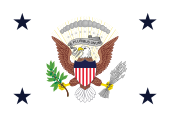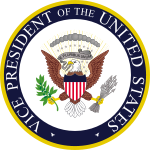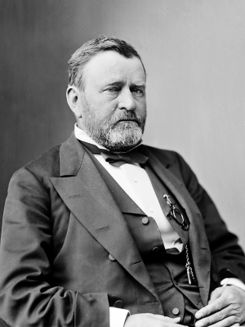Henry Wilson
| Henry Wilson | |
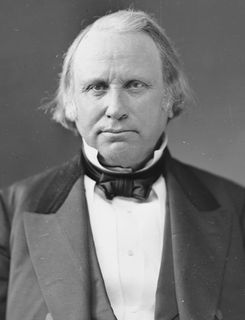 |
|
|
|
|
|---|---|
| In office March 4, 1873 – November 22, 1875 |
|
| President | Ulysses S. Grant |
| Preceded by | Schuyler Colfax |
| Succeeded by | William A. Wheeler |
|
|
|
| In office January 31, 1855 – March 3, 1873 |
|
| Preceded by | Julius Rockwell |
| Succeeded by | George S. Boutwell |
|
Chairman of the Senate Committee on Military Affairs
|
|
| In office 1861–1872 |
|
| Preceded by | Jefferson Davis |
| Succeeded by | John A. Logan |
|
|
|
| Born | February 16, 1812 Farmington, New Hampshire |
| Died | November 22, 1875 (aged 63) Washington, D.C. |
| Nationality | American |
| Political party | Republican |
| Spouse(s) | Harriet Malvina Howe Wilson |
| Religion | Congregationalist |
| Signature | |
Henry Wilson (February 16, 1812 – November 22, 1875) was the 18th Vice President of the United States and a Senator from Massachusetts. During the American Civil War, he was a leading Republican who devoted his enormous energies to the destruction of what he called the Slave Power, which he defined as a conspiracy of slave owners to seize control of the federal government and block the progress of liberty.
After the Civil War, he was elected vice president in 1872, on President Ulysses S. Grant's Republican ticket; he served in this position from March 4, 1873 until November 22, 1875, when he died in office.
Contents |
Biography
Wilson was born Jeremiah Jones Colbath in Farmington, New Hampshire. In 1833 he had his name legally changed by the legislature to Henry Wilson. Henry Wilson moved to Natick, Massachusetts in 1833 and became a shoemaker. He attended several local academies, and also taught school in Natick, where he later engaged in the manufacture of shoes. He was a member of the state legislature between 1841 and 1852, and was owner and editor of the Boston Republican from 1848 to 1851.
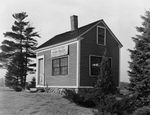
U.S. Congress
Wilson was an unsuccessful candidate for election in 1852 to Congress. He was a delegate to the state constitutional convention in 1853 and was an unsuccessful candidate for Governor of Massachusetts in 1853. In 1855 he was elected to the United States Senate by a coalition of Free-Soilers, Americans (aka Know Nothings), and Democrats to fill the vacancy caused by the resignation of Edward Everett. He was reelected as a Republican in 1859, 1865 and 1871, and served from January 31, 1855, to March 3, 1873, when he resigned to become Vice President. He was Chairman of the Committee on Military Affairs and the Militia and the Committee on Military Affairs. In that capacity, Wilson passed on over 15,000 nominations that Lincoln submitted during the course of the War, and worked closely with him on legislation affecting the Army and Navy.[1] In 1861 he raised and commanded the 22nd Regiment Massachusetts Volunteer Infantry.
A controversy that swirled around Wilson's name since 1861 was that he (while Chairman of the Committee on Military Affairs) may have revealed plans for the invasion of Virginia culminating in the First Battle of Bull Run to southern spy (and Washington society figure) Rose O'Neal Greenhow. Wilson (although married) had seen a great deal of Mrs. Greenhow, and while with her may have told her about the plans followed by Major General Irvin McDowell, which may have been part of the intelligence Mrs. Greenhow got to Confederate forces under Major General Pierre Beauregard. If so this information may have led to the Northern rout in that battle. However, in his most recent biography, an alternative (a Northern clerk named Horace White) was suggested as the real leak.

Vice President
Wilson was elected Vice President of the United States on the Republican ticket with President Ulysses S. Grant to replace the controversial Schuyler Colfax and served from March 4, 1873, until his death. His election victory was tainted, however, when it was shown that he was one of several major Republican (and Democratic) Congressmen and Senators who were offered bribes (and possibly took them) of shares in the Credit Mobilier scandal by its organizer, Congressman Oakes Ames. Wilson was cleared by the Senate inquiry, but his reputation was stained.
Declining health and death
The Vice President suffered a serious stroke in 1873. Although partly paralyzed, he fought to actively perform his duties as presiding officer over the United States Senate. On November 22, 1875, Wilson died from a second stroke while working in the United States Capitol Building at Washington, D.C. He was interred in Old Dell Park Cemetery, Natick.
Books
Among Wilson's published works are: History of the Anti-Slavery Measures of the Thirty-seventh and Thirty-eighth Congresses, 1861-64 (1864); History of the Reconstruction Measures of the Thirty-ninth and Fortieth Congresses, 1865-68 (1868); and an exceedingly valuable publication, History of the Rise and Fall of the Slave Power in America, (three volumes, 1872–77).
See also
- Henry Wilson Shoe Shop
References
- Ernest McKay, Henry Wilson, Practical Radical: Portrait of a Politician, (Port Washington, NY, London: National University Publications: Kennikat Press, 1971), Series in American Studies edited by James P. Shenton ISBN 0-8046-9010-3
- Henry Wilson, History of the Rise and Fall of the Slave Power in America, 2 vols. (Boston: J. R. Osgood and Co., 1873–77)
Trivia
- His desk was the desk used by Richard Nixon during his administration. Nixon really wanted the desk used by Woodrow Wilson, and when he asked for a "Wilson desk", he received the desk used by Henry Wilson. Nixon didn't figure out this mistake until later on.[2]
References
- ↑ 371. Herndon, William H. and Jesse Weik. Douglas L. Wilson and Rodney O. Davis (Editors) Herndon’s Informants: Letters, Interviews, and Statements About Abraham Lincoln (1998), § 444, p. 561.
- ↑ Urban Legend Page
External links
- Henry Wilson at the Biographical Directory of the United States Congress Retrieved on 2008-02-15
- Henry Wilson at Find a Grave Retrieved on 2008-02-15
- History of the antislavery measures of the Thirty-seventh and Thirty-eighth United-States Congresses, 1861-64 by Henry Wilson at archive.org
- History of the reconstruction measures of the Thirty-ninth and Fortieth Congresses, 1865-68 by Henry Wilson at archive.org
- History of the rise and fall of the slave power in America, Vol 1, Vol 2 and Vol 3 by Henry Wilson at archive.org
 Chisholm, Hugh, ed (1911). "Wilson, Henry". Encyclopædia Britannica (Eleventh ed.). Cambridge University Press.
Chisholm, Hugh, ed (1911). "Wilson, Henry". Encyclopædia Britannica (Eleventh ed.). Cambridge University Press.- 22nd Massachusetts Volunteer Infantry, Inc.
| Political offices | ||
|---|---|---|
| Preceded by Schuyler Colfax |
Vice President of the United States March 4, 1873 – November 22, 1875 |
Vacant
Title next held by
William A. Wheeler |
| United States Senate | ||
| Preceded by Julius Rockwell |
United States Senator (Class 2) from Massachusetts January 31, 1855 – March 3, 1873 |
Succeeded by George S. Boutwell |
| Party political offices | ||
| Preceded by Schuyler Colfax |
Republican Party vice presidential candidate 1872 |
Succeeded by William A. Wheeler |
| Honorary titles | ||
| Preceded by Charles Sumner |
Persons who have lain in state or honor in the United States Capitol rotunda November 25 – 26, 1875 |
Succeeded by James Garfield |
|
|||||||||
|
|||||||||||||||||||||||||
|
||||||||||
|
|||||||||||||
|
||||||||||||||||||||||||||||
